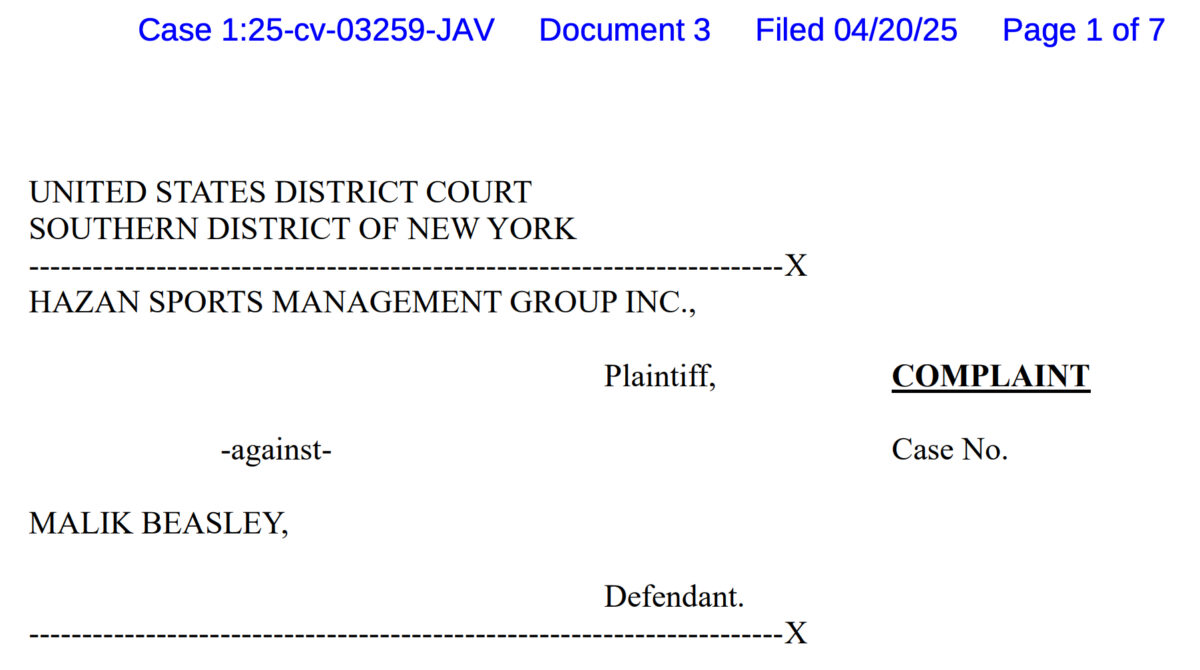A new player-agent dispute has emerged in the basketball world, with Hazan Sports Management Group Inc. (HSM) filing a complaint against Detroit Pistons shooting guard Malik Beasley in the U.S. District Court for the Southern District of New York. The lawsuit alleges breach of contract related to an exclusive marketing agreement and seeks damages in excess of $1 million.
Background of the Dispute
According to court documents filed on April 20, 2025, HSM claims it took a chance on Beasley when it signed him as a client on November 27, 2023. At that time, Beasley reportedly entered into two agreements with HSM:
- A Standard Player Agent Contract (SPAC) for on-court representation; and
- A separate Player Marketing Agreement granting HSM exclusive marketing rights for a four-year term.
The marketing agreement included a substantial advance of $650,000 provided to Beasley by HSM, who purportedly believed it could generate significant marketing opportunities for the player. Many in the industry know that these “marketing guarantees” often bear no resemblance to what is actually expected to be recouped by the agent through true marketing deals and is instead intended to induce the player to sign a SPAC.
The Alleged Breach
HSM alleges that after helping Beasley secure a one-year, $6 million contract with the Detroit Pistons (more than doubling his previous salary with the Milwaukee Bucks), Beasley abruptly terminated the relationship on February 26, 2025, just 15 months into the four-year agreement.
What makes this case particularly interesting is HSM’s claim that Beasley not only terminated their representation but also allegedly hired Brian Jungreis of Seros Partners to serve as his on-court agent and marketing representative, which HSM claims to be a direct violation of the exclusivity provisions in his agreement with HSM. I expect the NBPA to chime in as to the enforceability of such a provision.
The Liquidated Damages Provision
The marketing agreement contained a liquidated damages clause that requires Beasley to pay HSM $1 million if the agreement is terminated for any reason prior to the end of the initial four-year term. The complaint states:
“Player acknowledges and accepts that if this Agreement is terminated for any reason prior to the expiration of the Initial Term (a ‘Termination Event’) Player shall be required to pay the Marketing Agent liquidated damages in the amount of $1,000,000 (one million USD)…”
HSM argues this provision was accepted by both parties as “fair and acceptable in light of the amount of the Marketing Advance and the risk assumed by Marketing Agent.” An anticipated defense to this claim, should the case move past a motion to dismiss, is that this is actually an unenforceable penalty clause disguised as a liquidated damages provision, which is something I recently addressed in the context of NIL agreements.
Implications for Athletes and Agents
This case highlights several important considerations for professional athletes and their representatives:
- Liquidated damages clauses – These provisions are becoming more common in marketing agreements, especially when substantial advances are involved. Whether they are enforceable is something that needs to be analyzed on a case-by-case basis.
- Exclusivity provisions – Athletes need to fully understand the ramifications of granting exclusive marketing rights to an agency, and agents need to understand whether the restrictive covenants are enforceable.
- Early termination consequences – Breaking contracts early can trigger significant financial penalties that extend well beyond simply returning advance payments. Even if not valid and binding, it still could result in litigation as we see here.
What’s Next
HSM is seeking judgment against Beasley on three claims:
- Breach of contract (in excess of $1 million);
- Liquidated damages ($1 million plus marketing fees); and
- Legal fees (expected to exceed $250,000).
The case will likely center on whether the liquidated damages provision is enforceable under New York law, which requires such provisions to be reasonable concerning the anticipated harm and not function as a penalty.
For sports agents and players alike, this case serves as an important reminder of the binding nature of marketing agreements and the potentially steep consequences of early termination. It also raises questions about whether such substantial liquidated damages provisions may have a chilling effect on players seeking to change representation.
Beasley has not yet responded to the lawsuit and no lawyer has noticed an appearance on his behalf.
